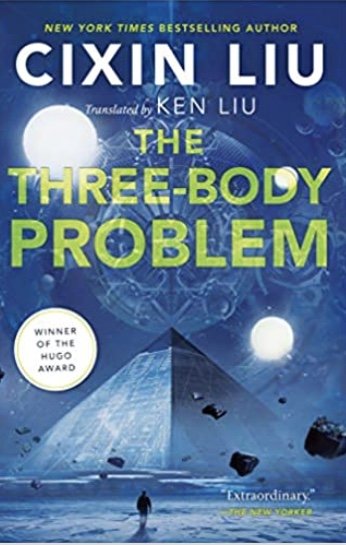The Three-Body Problem by Cixin Liu (Tor)
Although the Cultural Revolution wasn’t the greatest of humanity’s evils, three deaths that it caused during the late 1960s would be the impetus for the destruction of life on earth in the following century. Ye Wenjie saw her father and her favorite university professor die under the mental and physical torture inflicted by the Red Guards, while her sister was killed by those who had been in the first wave of this reign of terror.
When the 20th century makes room for the 21st, Ye Wenjie has the knowledge and the opportunity while working at a military installation to send a message out into space. When she receives a reply, it tells her repeatedly, “Do not answer.” Any response she might make would lead to the invasion and conquest of her planet. Wenjie, steeped in the brutal history of the past century, welcomes the thought of a hostile take-over and the doom of humanity is sealed by her next message.
An invasion from outer space is an ordinary theme in many works of science fiction, but this time it’s been twisted and turned by Cixin Liu into a trilogy, with The Three-Body Problem as its fiendish and confounding introduction. Using an intricate, multi-leveled virtual reality game as a snare, the extraterrestrial world of Trisolaris finds its way into the minds of other disillusioned members of the human world. Giving them peeks at the history of Trisolaris, with its three suns creating alternating time periods of Chaos and Stability, showing how Trisolarans survive times of Chaos by dehydrating into “dry, fibrous objects” which they rehydrate back to life during Stabile Eras, Trisolaris gains toeholds into some of the best human intellects. With its superior technology, Trisolaris begins to damage the acceleration of human technological prowess, an acceleration that’s far swifter than their own, due to Earth’s environmental advantages. To Trisolarans, humans live in paradise, developing under the gentle power of a single sun, and they want this existence for themselves.
In a diabolical game of chess, Trisolaris begins a subtle destruction of Earth’s science, placing doubts of its importance in human minds and planting skepticism in the minds of scientists by carefully revealing the limits of what they thought were laws of the universe. Ye Wenjie becomes the leader of the Earth Trisolaris Organization, joined by an American plutocrat who carries on communication with the Trisolarans. Both of them welcome the destruction that Trisolaris promises.
An attack force launched by Trisolaris will reach the Earth in four or five centuries, a successful capture of the interplanetary communication reveals. Trisolaris has no fear that Earth will find a way to repel its future invasion, sending human scientists a disdainful message through space and time: “You’re bugs.”
However, as a nonscientist points out to the panic-stricken intellectuals, bugs are unconquerable, prevailing against attacks of technology.
The ffirst installment of Cixin Liu’s trilogy was first published in a Chinese magazine as a serial in 2006. Published as a book two years later, Its English translation came out in 2014, two years before politicians in the US placed science under attack. This time-frame makes the Trisolaran use of ignorance as a weapon seem prescient now. After all, how many people have died from Covid-19 in 2020 because they didn’t believe in the science that provided vaccinations?
Along with its predictive qualities, The Three-Body Problem goes beyond ordinary sci-fi with its fully-fleshed characters, its enigmatic glimpses into the field of physics, and its clever distortion of time as its story unfolds. “Science fiction should be the literary genre most accessible to readers of different nations,” Cixun Liu says in an afterword--not only accessible to science fiction readers but irresistible to those who usually would rather read the words on a cereal box instead. This book takes a soaring leap into the literary possibilities of science fiction, with its next installment, The Dark Forest, promising to extend that neglected genre even deeper into the realm of literature.~Janet Brown
